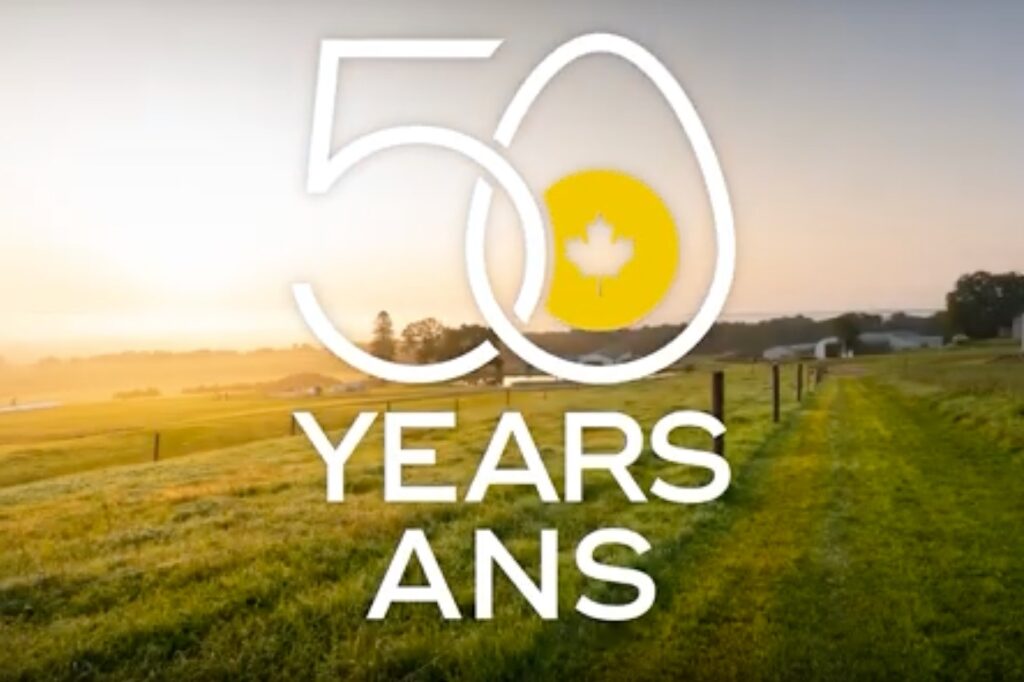
From the Editor: EFC turns 50 with an eye on 100
Brett Ruffell
Features Marketing BoardsOrganization marks milestone with a collection of videos that pay homage to its past with an eye towards an optimistic future.
 A still from EFC's 50th anniversary video series.
A still from EFC's 50th anniversary video series. Egg Farmers of Canada (EFC) is the first of the four national poultry organizations to turn 50. And it’s marking the occasion with a collection of videos available at eggfarmers.ca that pay homage to its past with an eye towards an optimistic future.
The series breaks EFC’s history down to four periods: the 1970s and 1980s; the 1990s and 2000s; the 2000s to present; and the next 50 years.
In the first period, the Canadian Egg Marketing Agency was launched with the Farm Products Marketing Agencies Act, which established the system of egg supply management in Canada. This ushered in a new era of collaboration for egg farmers and provided the foundation needed to nurture a thriving egg industry.
The turn of the millennium was driven by enhanced collaboration. Canada’s egg farmers worked together to advance new on-farm programs, initiatives to balance the national egg supply and education programs designed to share the latest nutrition science with the healthcare community. The Canadian Egg Marketing Agency also embraced the new name of Egg Farmers of Canada.
The 2000s to present day has been a period of tremendous growth for Canada’s egg industry, reaching new heights in egg production and consumption. It has also been a time to
innovate, with the sector advancing several cutting-edge initiatives in research, sustainability and social impact.
And looking forward, EFC used the celebration to announce its commitment to achieve net-zero greenhouse gas emissions by 2050 as the next step in the Canadian egg farming industry’s sustainability journey.
“Stepping up our commitment to eliminate greenhouse gas emissions is a natural extension of our already established holistic approach to sustainability – an approach that continues to guide our actions today and into the future,” says EFC chair Roger Pelissero. “A net-zero goal naturally builds on these efforts and further entrenches our commitment towards the environment in the core of our farming operations.”
Canadian egg farmers have a longstanding track-record of supporting sustainable initiatives and programs, including investment in a comprehensive science-based research program, farm level decision-making tools, and environmental technologies.
This programming has led to efficiencies and productivity gains within the egg farming sector, allowing farmers to produce more eggs while using fewer resources.
The recently launched National Environmental Sustainability and Technology Tool is one example of how egg farmers are improving environmental outcomes. Canadian egg farmers can use the tool to set sustainability goals, create action plans, track progress and work towards making their farms even more sustainable.
“I am extremely proud of the work that egg farmers across Canada have undertaken to evolve and adapt their farming operations, supporting both Canada-wide and global efforts to address climate change,” Pelissero adds.
“We know we cannot achieve this goal alone, and we look forward to working side-by-side with our supply chain partners and stakeholders to develop and implement a roadmap to net-zero that takes into account the unique circumstances of our farming operations and value chain. Our next step is to roll out a comprehensive consultation that evaluates how we can scale up our initiatives and put a plan into practice.”
Print this page